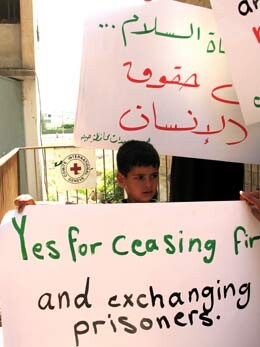IRIN 7 August 2006

Palestinian boy pickets in front of the headquarters of the International Committee of the Red Cross in the West Bank city in Jenin, protesting against the Israeli aggression against the Lebanese and Palestinian people, 3 August 2006. (MaanImages/Raed Abu Baker)
The delegation “is going to the UN Security Council meeting tomorrow to alert them from taking decisions for solutions that cannot be implemented and complicate situations on the ground,” said Lebanese Prime Minister Fouad Siniora after Monday’s meeting.
Calling it “perfectly appropriate” for the Arab delegation to come and express its views regarding the current resolution in the council tomorrow afternoon, US Ambassador John Bolton noted that council members would listen “very carefully” to what the Qatari and United Arab Emirates Foreign Ministers and Secretary-General of the Arab League Amr Moussa would have to say.
“If they think it is important enough for them to come to New York, then it’s important for us to listen to them,” said Bolton.
Bolton noted that he and other council members would listen but could not be expected to redraft the resolution and have it ready when the Arab delegation arrives.
One of the considerations for a new draft would be the creation of a “robust force” of 15,000 Lebanese Armed Forces (LAF) soldiers that could be deployed to southern Lebanon if Israel withdraws, according to Tarek Mitri, Special Envoy of the Lebanese Council of Ministers after he met with UN Secretary-General Kofi Annan on Monday in New York.
“The reason why I’ve come to see the Secretary-General … [is] the Council of Ministers decided unanimously, expressing its readiness to deploy immediately 15,000 Lebanese troops - Lebanese army - that would fill in the vacuum … following Israel’s withdrawal from Lebanon and allowing the refugees who have been displaced and whose buildings have been destroyed, or even flattened, to go back,” Mitri told reporters after the meeting.
This unanimous decision by the Lebanese council is in line with Security Council resolution 1559 (2004), calling on Lebanon to exert its authority over all its territory.
Lebanon’s displeasure with the French-US draft was the Arab League’s reasoning to call an emergency meeting in Beirut on Monday to look for consensus on the Lebanese issue and reiterate the seven-point cease-fire solution agreed to by all members of the Lebanese government, including Hezbollah, last week.
The seven-point plan, agreed to last week, called for a mutual release of prisoners; the withdrawal of Israeli troops and their withdrawal from Sheba’a Farms and placing them under temporary UN control; expanding the UNIFIL force in southern Lebanon; allowing displaced civilians to return home; reaffirming the 1949 armistice agreement between Lebanon and Israel; and reconstructing the south.
The US-French draft does not reflect the Arab contention that there should be an immediate pullout of 10,000 Israeli troops from southern Lebanon, nor does it explicitly give Sheba’a Farms over to the UN, merely noting that the borders should be delineated, “especially in those areas where the border is disputed or uncertain, including the Sheba’a Farms area.”
Two alternative paragraphs to the French-US draft were proposed to the United Nations Security Council by the Lebanese government on Sunday, mirroring the seven-point solution that was reaffirmed by the emergency Arab League meeting in Beirut on Monday, and giving more weight to the Lebanese troop deployment plan.
According to the amendments, Lebanon calls on Israel to hand over its positions to UNIFIL, the UN Interim Force in Lebanon, to withdraw behind the ‘Blue line,’ the Israeli-Lebanese border demarcated by the UN in 1978, and “UNIFIL will in turn hand over within 72 hours the area between the Litani river and the Blue line to Lebanese Armed Forces.”
This alternate operating paragraph one gives the majority of responsibility to the LAF to hold the territory. The paragraph two alternate “calls for the immediate withdrawal of Israel from the Sheba’a Farms and handing it over to UN custody, pending delineation of the border in this area between Lebanon and Syria.”
On the other hand, Jean-Marc de la Sabliere, French Ambassador and co-drafter of the council resolution, told reporters on Monday that the French-US draft is still a “good one.”
“It addresses the immediate question of the cessation of hostilities,” said de la Sabliere. “We all have this in mind in the council that the civilian population is suffering a lot in Lebanon, and also in Israel. Seven hundred thousand persons have been displaced in Lebanon. The situation is bad for the civilian population,” he added.
Related Links
This item comes to you via IRIN, a UN humanitarian news and information service, but may not necessarily reflect the views of the United Nations or its agencies. All IRIN material may be reposted or reprinted free-of-charge; refer to the copyright page for conditions of use. IRIN is a project of the UN Office for the Coordination of Humanitarian Affairs.